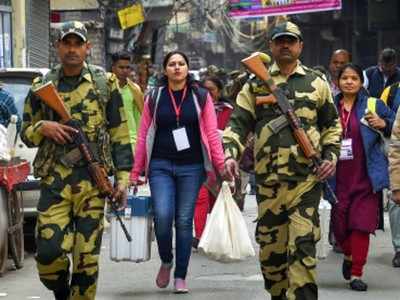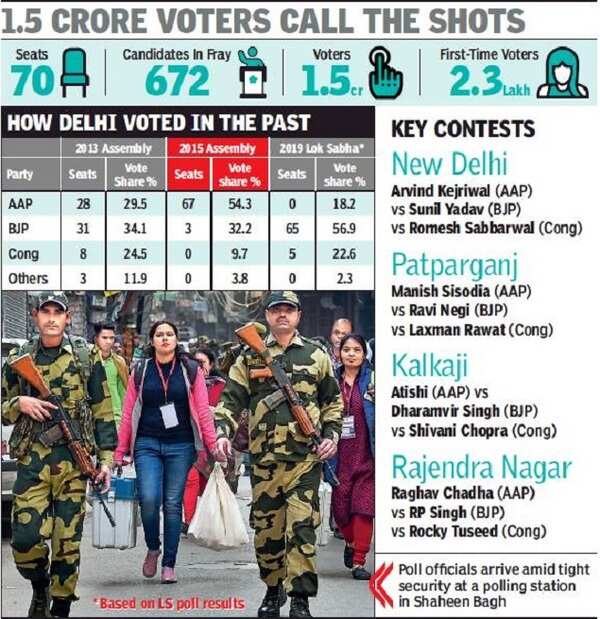- News
- Elections News
- Assembly Elections News
- Delhi assembly elections: After bitterly fought campaign, capital to vote today
This story is from February 8, 2020
Delhi assembly elections: After bitterly fought campaign, capital to vote today

PTI photo
NEW DELHI: Battle lines have been drawn for an interesting contest that will not only give a new government to the national capital but also decide the political fortunes of the three key players. About 1.5 crore eligible voters will on Saturday get the opportunity to elect representatives for the 70-member Delhi assembly from 672 candidates – 593 men and 79 women – who, in the past two weeks, campaigned extensively.
AAP had got a record mandate in the 2015 assembly polls, when it won 67 of 70 seats. Wooing the electorate with its development agenda and promises to provide an honest government that takes care of the poor, AAP this time faces a well-coordinated and intensive challenge from BJP. Will its promise to continue giving free electricity, water, health, education and transport keep its rivals at bay? The party has not won a single election anywhere in India since that resounding victory in 2015, curtailing its dream to expand in other parts of the country.

In 2015, AAP polled over 54.3% votes while BJP got 32.2% and Congress 9.7%. On the other hand, BJP has not won a single assembly election in Delhi after 1993 and its resolve to form a government this time was evident in its high-decibel campaign which highlighted what it sees as a threat to national security. BJP invoked major decisions taken by its government — amending the citizenship law, abrogation of Articles 370 and 35A, and surgical strikes on Pakistan — to seek votes, besides highlighting what it claims to be AAP’s failure to ensure supply of clean water, installation of CCTV cameras and giving free Wi-Fi in Delhi. Both parties ran a highpitched campaign with several public meetings and roadshows daily.
The saffron party’s campaign in Delhi — which involved close to 200 MPs, 11 chief ministers and over 50 central ministers — was personally managed by Union home minister Amit Shah.
BJP functionaries held about 350 events in 70 constituencies every day with Amit Shah himself addressing four to five public meetings daily. This time BJP didn’t declare its candidate for chief minister and the election is fought on the image of PM Modi and under the supervision of Shah.
Congress is fighting to stay relevant in Delhi politics. Wiped out in the 2015 elections when it polled less than 10% votes and didn’t win a single seat, the grand old party has been desperately trying to regain its traditional vote bank of slums, resettlement colonies, Dalits and minorities. Though its campaign lacked the incisiveness of the two rival parties, the last week of electioneering witnessed top Congress functionaries — Rahul Gandhi, Priyanka Gandhi Vadra Manmohan Singh and chief ministers of four states, among others — making an appeal to bring back the party that governed Delhi for 15 years and built “world class” infrastructure.
The party openly extended its support to anti-CAA protesters at Shaheen Bagh and Jamia Millia Islamia with an eye on Muslim voters. Apart from free electricity and water to the poor, pucca houses to slum-dwellers, more amenities and ownership rights to residents of unauthorised colonies, clean tap water in every household, safety to women, jobs or allowance to unemployed, cleaner Yamuna, more buses and new schools and colleges are among major promises made by all three parties.
All three parties singled out the Poorvanchalis, who form almost a fourth of the total vote share, for special attention. All of them have given tickets to several candidates from the region. They have also been talking about regularisation of 1731 unauthorised colonies and giving ownership rights of properties to their residents to influence the 25 lakh voters living there. Several seats, including the coveted New Delhi will throw up interesting contests. New Delhi has the distinction of giving a CM since 1998 when Sheila Dikshit fought her first election here.
In New Delhi, Arvind Kejriwal faces two firsttimers – Sunil Yadav of BJP and Romesh Sabbarwal of Congress. In Patparganj, deputy CM Manish Sisodia is also pitted against two first-timers – Ravi Negi of BJP and Laxman Rawat of Congress. In Shakur Basti, veteran BJP leader and former MLA SC Vats is pitted against PWD minister Satyendar Jain while in Ballimaran, there is a keen contest between Congress heavyweight and former minister Haroon Yusuf and food and civil supplies minister Imran Hussain of AAP. In Chandni Chowk, it’s a recontest between those who faced each other in the last election, but this time they have changed their parties.
Former AAP MLAs Alka Lamba (Chandni Chowk) and Adarsh Shastri (Dwarka) are contesting on Congress tickets this time while former Congress MLA Parlad Singh Sawhney is the AAP candidate in Chandni Chowk.
AAP had got a record mandate in the 2015 assembly polls, when it won 67 of 70 seats. Wooing the electorate with its development agenda and promises to provide an honest government that takes care of the poor, AAP this time faces a well-coordinated and intensive challenge from BJP. Will its promise to continue giving free electricity, water, health, education and transport keep its rivals at bay? The party has not won a single election anywhere in India since that resounding victory in 2015, curtailing its dream to expand in other parts of the country.

In 2015, AAP polled over 54.3% votes while BJP got 32.2% and Congress 9.7%. On the other hand, BJP has not won a single assembly election in Delhi after 1993 and its resolve to form a government this time was evident in its high-decibel campaign which highlighted what it sees as a threat to national security. BJP invoked major decisions taken by its government — amending the citizenship law, abrogation of Articles 370 and 35A, and surgical strikes on Pakistan — to seek votes, besides highlighting what it claims to be AAP’s failure to ensure supply of clean water, installation of CCTV cameras and giving free Wi-Fi in Delhi. Both parties ran a highpitched campaign with several public meetings and roadshows daily.
Chief minister Arvind Kejriwal shouldered the responsibility of AAP’s campaign with Rajya Sabha MP Sanjay Singh and Punjab MP Bhagwant Mann pitching in. Kejriwal held over a dozen townhalls, taking his government’s report card to the public.
The saffron party’s campaign in Delhi — which involved close to 200 MPs, 11 chief ministers and over 50 central ministers — was personally managed by Union home minister Amit Shah.
BJP functionaries held about 350 events in 70 constituencies every day with Amit Shah himself addressing four to five public meetings daily. This time BJP didn’t declare its candidate for chief minister and the election is fought on the image of PM Modi and under the supervision of Shah.
Congress is fighting to stay relevant in Delhi politics. Wiped out in the 2015 elections when it polled less than 10% votes and didn’t win a single seat, the grand old party has been desperately trying to regain its traditional vote bank of slums, resettlement colonies, Dalits and minorities. Though its campaign lacked the incisiveness of the two rival parties, the last week of electioneering witnessed top Congress functionaries — Rahul Gandhi, Priyanka Gandhi Vadra Manmohan Singh and chief ministers of four states, among others — making an appeal to bring back the party that governed Delhi for 15 years and built “world class” infrastructure.
The party openly extended its support to anti-CAA protesters at Shaheen Bagh and Jamia Millia Islamia with an eye on Muslim voters. Apart from free electricity and water to the poor, pucca houses to slum-dwellers, more amenities and ownership rights to residents of unauthorised colonies, clean tap water in every household, safety to women, jobs or allowance to unemployed, cleaner Yamuna, more buses and new schools and colleges are among major promises made by all three parties.
All three parties singled out the Poorvanchalis, who form almost a fourth of the total vote share, for special attention. All of them have given tickets to several candidates from the region. They have also been talking about regularisation of 1731 unauthorised colonies and giving ownership rights of properties to their residents to influence the 25 lakh voters living there. Several seats, including the coveted New Delhi will throw up interesting contests. New Delhi has the distinction of giving a CM since 1998 when Sheila Dikshit fought her first election here.
In New Delhi, Arvind Kejriwal faces two firsttimers – Sunil Yadav of BJP and Romesh Sabbarwal of Congress. In Patparganj, deputy CM Manish Sisodia is also pitted against two first-timers – Ravi Negi of BJP and Laxman Rawat of Congress. In Shakur Basti, veteran BJP leader and former MLA SC Vats is pitted against PWD minister Satyendar Jain while in Ballimaran, there is a keen contest between Congress heavyweight and former minister Haroon Yusuf and food and civil supplies minister Imran Hussain of AAP. In Chandni Chowk, it’s a recontest between those who faced each other in the last election, but this time they have changed their parties.
Former AAP MLAs Alka Lamba (Chandni Chowk) and Adarsh Shastri (Dwarka) are contesting on Congress tickets this time while former Congress MLA Parlad Singh Sawhney is the AAP candidate in Chandni Chowk.
End of Article
FOLLOW US ON SOCIAL MEDIA
